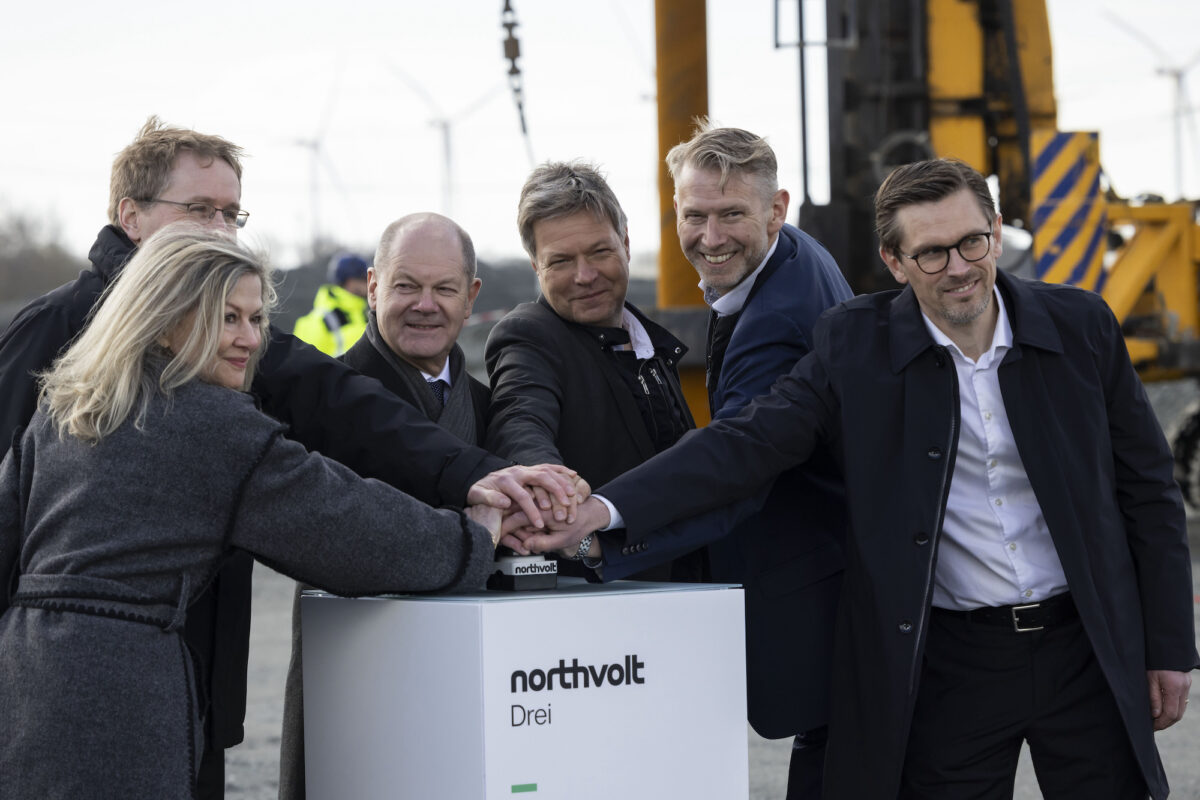Swedish battery maker Northvolt has officially initiated the construction of its gigafactory in Heide, Germany. Once completed, the Northvolt Drei gigafactory will produce 60 GWh of battery cells per year using locally sourced renewable energy.
Plans for Nortvolt Drei were first revealed in 2022. The battery maker then secured EUR 155 million ($167.9 million) of Important Project of Common European Interest (IPCEI) funding for construction. In January of this year, the European Commission approved EUR 902 million of German government funding under the state aid law.
“Without the aid, Northvolt would establish the plant in the United States, where support was offered in particular under the Inflation Reduction Act,” said the European Commission.
Last week, Germany Chancellor Olaf Scholz, Vice Chancellor Robert Habeck, and Minister-President of Schleswig-Holstein Daniel Günther – together with Northvolt CEO Peter Carlsson and Northvolt Drei CEO Christofer Haux – started piling machinery at the Northvolt Drei industrial site, marking the launch of the project.
Scholz described Northvolt’s investment as a strategically important one.
“The production of good cars beyond the combustion engine continues to form the backbone of our industrial sector. For that, we need battery cells made in Germany, made in Europe,” he said. “It is therefore good news for our entire country that, here in the north, battery cells produced in a climate-friendly way will be manufactured for one million cars a year in the future.”
The gigafactory will use wind power available in the region, helping Northvolt to deliver on its mission to mass produce the world’s greenest batteries. The industrial complex will employ roughly 3,000 people once it reaches full production capacity, with initial operations commencing in 2026.
Popular content
The site was selected two years ago. According to Northvolt, the local community has backed the project.
“I also want to thank the people of Dithmarschen,” Christofer Haux, the CEO of Northvolt Germany, said at the launch. The battery maker says it holds monthly hearings with local stakeholders in Dithmarschen. “It’s unprecedented for Germany that a large-scale industrial project built on 110 hectares of land enjoys such strong backing from the local population.”
Northvolt, established in 2016, has quickly become Europe’s best-funded climate tech startup, with the backing of big investors such as Volkswagen, BlackRock, and Goldman Sachs. Most recently, the company raised $5 billion of debt financing to help it expand its first gigafactory in Sweden, Northvolt Ett, to up to 60 GWh of annual output capacity, in addition to building a recycling facility on the same site. The deal represents the largest green loan in Europe to date.
In December 2021, Northvolt became the first manufacturer to produce battery cells fully designed, developed and assembled by a homegrown European battery company. Those first cells rolled off its manufacturing lines at Northvolt Ett. In the meantime, the company has revealed plans for three more plants in Germany, Canada, and Sweden.
To date, the company has secured more than $50 billion of orders from key customers, including BMW, Fluence, Scania, Volvo Cars and Volkswagen Group.
This content is protected by copyright and may not be reused. If you want to cooperate with us and would like to reuse some of our content, please contact: editors@pv-magazine.com.



By submitting this form you agree to pv magazine using your data for the purposes of publishing your comment.
Your personal data will only be disclosed or otherwise transmitted to third parties for the purposes of spam filtering or if this is necessary for technical maintenance of the website. Any other transfer to third parties will not take place unless this is justified on the basis of applicable data protection regulations or if pv magazine is legally obliged to do so.
You may revoke this consent at any time with effect for the future, in which case your personal data will be deleted immediately. Otherwise, your data will be deleted if pv magazine has processed your request or the purpose of data storage is fulfilled.
Further information on data privacy can be found in our Data Protection Policy.